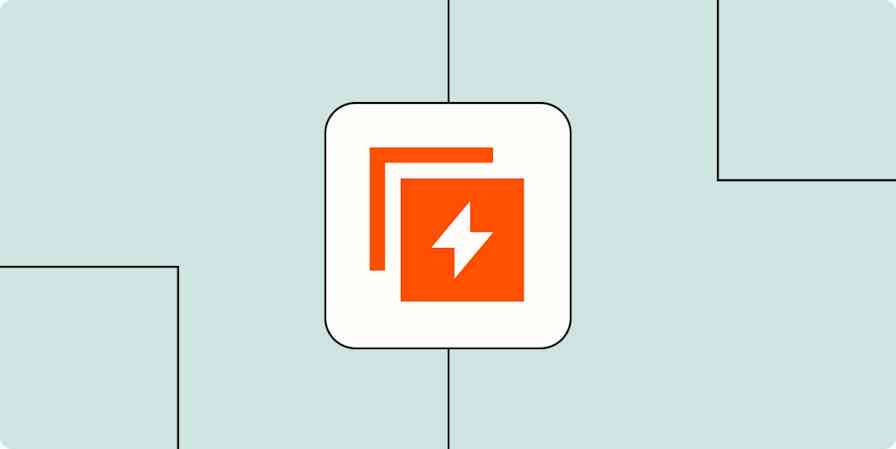Real estate agents have been using Facebook ads for years, but Facebook lead ads have revolutionized lead collection in the industry. Facebook lead ads help you find leads in real time—a huge advantage given the importance of timing in real estate. Even a few minutes between interest and contact can be the difference between your next big commission and losing out to the competition.
Here we'll discuss how you can use Facebook lead ads to help your real estate business grow:
The Benefits of Facebook Lead Ads
Using Facebook lead ads, real estate agents can connect with people who are already looking to buy or sell homes—right from within Facebook.
These ads might look like a conventional Facebook ad, but they include a sign up button and a lead form, making it easy for agents to capture the interest of engaged leads while they're still on Facebook's platform.
Let's say you've just listed a new home. You post a Facebook lead ad targeting potential leads on specific demographic information such as location or income. The targeted leads will see the ad as they scroll through their newsfeed on both desktop or mobile devices. If someone is interested in learning more, they can click the call to action in the ad.
After clicking the CTA, a "context card" will appear that contains more information about the ad or your brokerage. The card will also gather more information about the lead, such as area in which they're looking to buy a house or a particular price range. The contact information they've shared with Facebook will be pre-populated and can be submitted with a single click.
You can see that lead ads offer a host of benefits:
They're quick and painless. Facebook lead ads remove the friction of sign up. Beyond those first few clicks, no additional action is needed: The lead's name and email or phone number are already pre-populated. A lead can go from seeing the ad to getting the information they want in a matter of seconds.
They provide real leads. You usually have have to sort through a number of fake emails and phone numbers to get to the real leads—it's frustrating and a waste of valuable time. Lead ads help lower the quantity of spammy leads by pre-populating the lead's real information.
They lead to fewer drop-offs. Lead ads offer a more streamlined user experience. Interested buyers and sellers can complete the process without leaving the platform.
They eliminate manual segmenting. You don't have to create different landing pages or sign-up forms for different segments or potential leads.
They allow you to access leads in real time. When a lead is generated via Facebook lead ads, Zapier can automatically send the information to agents using their preferred communication method.
Getting Started with Facebook Lead Ads
If you're already familiar with Facebook ads, getting a lead ad set up is simple.
Step 1: From the Facebook Ads Manager, create a new ad. Under Campaign > Objective, select Lead generation.
Step 2: Select the Facebook page you want to promote.
Step 3: Define the parameters of your target audience.
Step 4: Select your ad format (how it's displayed across Facebook).
Step 5: Upload your selected images (or video) and write the ad copy and CTA.
Step 6: Create your lead form. (This is optional but recommended. It's the screen your leads will see after they click the CTA button and can include additional information, questions, a privacy policy, and/or a thank you screen.)
Step 7: Your ad is ready to go. Select your dates and budget, and launch it.
For a more in-depth walk through, including screenshots, take a look at our guide to Facbeook lead ads.
Setting a budget
There's no one-size-fits-all number for Facebook lead ads budgeting. The general number experienced real estate agents provide is $300-$500/month, but it's not that simple. Your budget will change not just based on how much you have set aside for marketing, but also on your geographic location and the prices of homes in your region.
Misty Weaver heads the Dream Weaver Team in Frederick County, Virginia. Her business operates out of a small and relatively rural area, so she's able to run campaigns that cost less than $40 and still generate dozens of leads—it rounds out to about $0.50/lead.
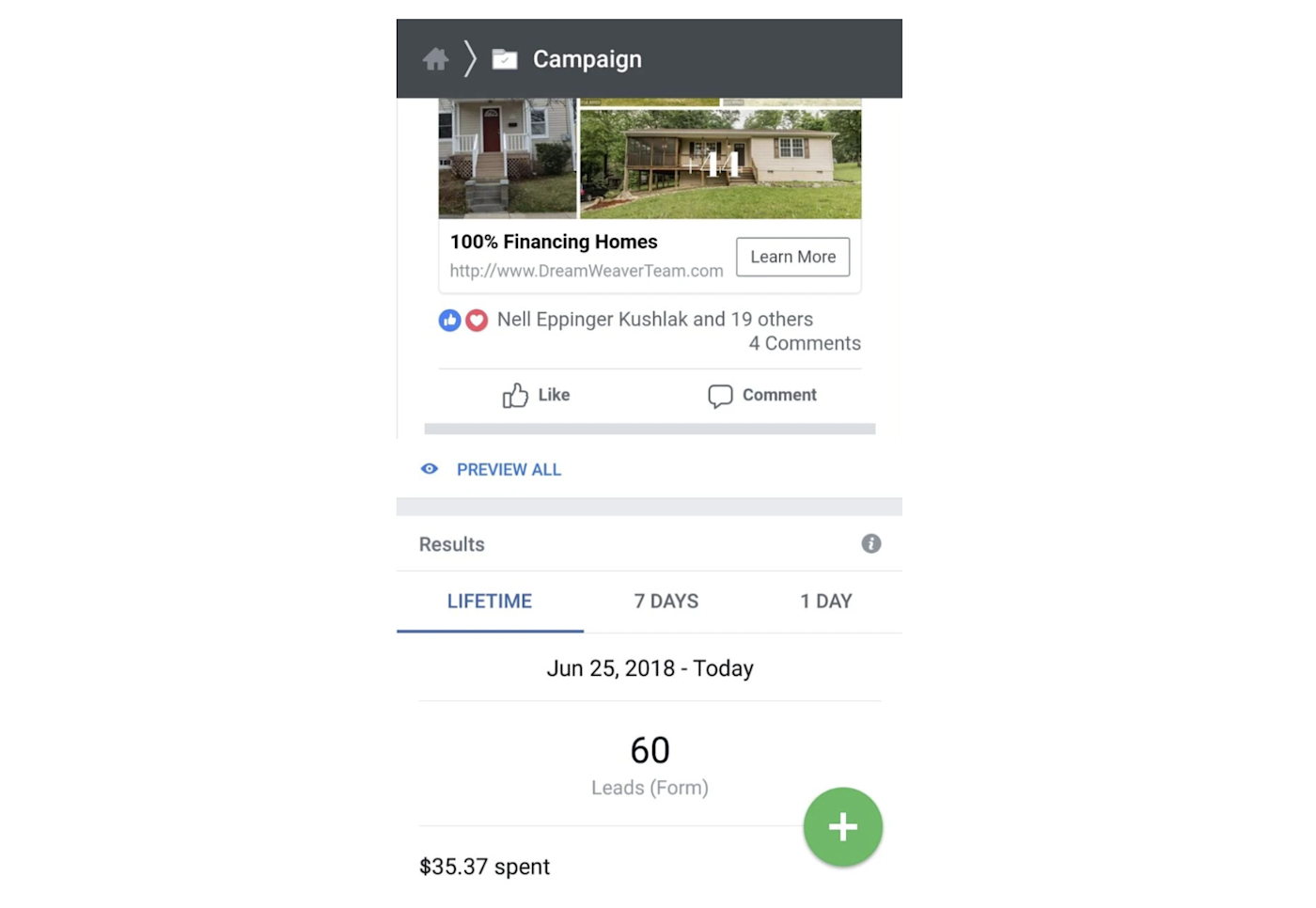
Now let's look at the other end of the spectrum.
John Huntinghouse is the Digital Marketing Director for Epic Marketing, a Utah-based marketing agency that works with real estate agents. His agency operates in a bigger city with higher ticket suburbs. He runs campaigns with much larger budgets for his clients, and he's been able to build a list of qualified leads for approximately $23/lead—vastly different from Misty Weaver's cost.
So what happens if you're in an expensive area but don't have a big budget to start?
You're not out of luck: Try running short, targeted campaigns instead. A monthly budget of $100 can be spread into one small $10/day campaign running for 10 days. Or, if you have a really small area to target, two $5/day campaigns that focus on a specific listing. The ability to run these sorts of small-dollar ads is why Facebook lead ads is such an important tool. It doesn't cost a lot of money to start generating good leads.
Marketing Strategies for Real Estate Agents
Facebook lead ads offer a wealth of potential for real estate agents. With the help of Facebook's in-depth demographic data—which can get as specific as identifying first-time homebuyers—you can reach both buyers and sellers in hyper-targeted markets.
But within that targeting, there's still loads of flexibility. For example, you can advertise everything from specific properties to home value reports to area foreclosure listings, and everything in between.
So how do you decide how to use Facebook lead ads for your business? Take a look at some Facebook lead ads marketing strategies from other real estate agents.
Embrace ad targeting
As controversial as it may be, Facebook is crucial for marketing namely because of the data it has on users. Facebook goes beyond segmenting by ZIP code: It's able to account for both demographic status and behavioral patterns.
Aaron Bowman, a Realtor with Mazz Real Estate explains:
The best part when using Facebook lead ads is you can [...] run ads for a certain ZIP codes [and] demographics: first time home buyer, income 50k and up, most likely to move, just to name a few.
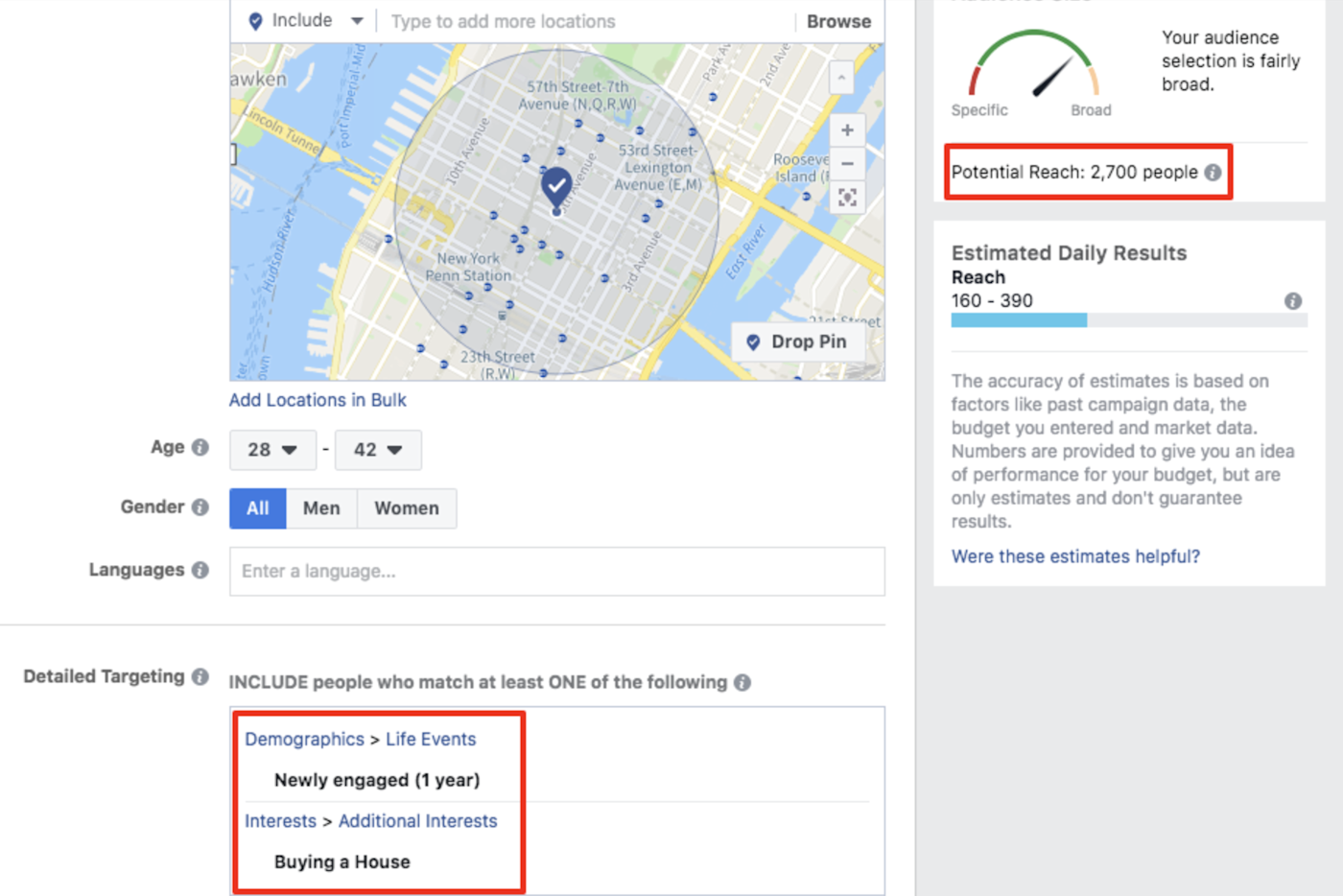
Because Facebook allows for layering, you can get extremely specific in your targeting, even going so far as to include people who've checked out Zillow or Trulia, for example. Here are a few more examples of some of the relevant demographic targeting you can explore with Facebook lead ads:
Looking to buy a home. Believe it or not, Facebook has a way to determine this. It should probably be first on the list of your targeted demographics.
Moving. Another category Facebook can get you some info on.
Location. Target a specific ZIP code or radius from a specific point on a map.
Age. Typically 20-year-olds aren't home buyers, but 45-year-olds might be.
Income. If you're targeting a more high-end buyer, you might include a specific income.
Job title. People in certain professions move around more than others.
Renters. Renters might be looking to transition into home ownership.
First-time homebuyer grants. Some real estate agents specialize in first-time homebuyers, so this would be a key demographic to target.
Pages liked. Be sure to include pages that indicate interest in real estate. That could include Zillow, Redfin, or even HGTV, for example.
New job. People who have new jobs might be interested in moving or buying a new home—especially if that new role came with a raise.
Recently moved. It's not uncommon for people who've moved to a new city to rent for a while to check out different areas. They might be ready to buy a home after a few months.
Recently engaged. Lots of people start looking to a buy a house after getting engaged or married.
By combining that granular type of targeting with the other tips below, you'll be sure you're using your marketing dollars on the right people.
Create custom and lookalike audiences
Facebook lead ads allows you to take advantage of leads who are already in your database. By using a custom audience, your ads will target those existing leads. Aaron Bowman explains the value:
This allows you to keep marketing to people who you have already reached out to. Then when you talk to them, they are like "I see your face everywhere." [It] makes you stand out like a celebrity in your area.
With real estate depending so heavily on smaller localized areas, being the agent who seems to pop up everywhere is a great way to stay top of mind. Remember when the best agents had their faces pop up on park benches and the sides of buses? Today, Facebook lead ads give you that same effect.
Lookalike audiences, on the other hand, target people who resemble those in your database. You know your database leads are qualified, so it's likely that people who match that demographic and those behavioral patterns will also be solid leads.
For more information on how to set up these audiences, we'll send you to the source: Facebook's articles about custom audiences and lookalike audiences.
Be attentive to timing
Deciding when to run ads might not be as simple as you think—especially in real estate, where timing can be the make or break issue.
Research shows that when it comes to responding to new leads, timing matters. Many studies—including this one from from Drift—have found that if a lead doesn't hear back from you in as little as five minutes after first contact, your chances of speaking with them decrease dramatically.
Roof.ai, a real estate technology brand, decided to test this theory within the industry. They contacted the top 74 real estate real estate brokerages in the U.S. to check their response time.
The results were not good.
Only 9% of the brokerages had an agent respond within five minutes, and 41% never replied at all. This highlights a huge opportunity for real estate agents who can set up a system where quick responses are prioritized. And that means running ads during times when you'll be able to respond within minutes to new leads.
Jeff Miller, a real estate agent at AE Home Group with offices across Maryland, highlights just how important timing is for his agents.
We've found that once a Facebook user submits their information, you have a short 5-minute time window in which you can reach out and have a high percentage chance that they will answer your call. Once a user closes Facebook, they are quickly moving onto something else, and buying or selling a house quickly goes from front of mind to removed from their attention.
Of course, you need to find that sweet spot: Your ability to respond quickly doesn't mean much if no one is clicking your ads. Keep your eye on high traffic times for the people you're targeting, and be sure you're available during those time frames. Otherwise, you're likely going to have to chase down leads who otherwise would have been easy to connect with.
Create a lead nurturing system
Not every lead is going to be ready to buy or sell right away. Misty Weaver explains:
Online leads are further out in the buying and selling process, but more likely to give their contact info, so I get to stay in touch with them before they are on other agents' radar.
As a real estate agent, getting that first touch with a lead is key. Regardless of where a lead is in the home buying process, the first agent to respond has the advantage. A study by LeadQual showed that there's a 238% increase in conversion if you're the first person to contact a lead.
In addition to the timing aspect, this also means you need to create a solid lead nurturing system. Automate your Facebook lead ads so that your leads are automatically added to a drip campaign. This will allow you to keep in contact throughout their journey—and you'll be there when they're ready to bite the bullet.
Experiment with different styles
Facebook offers multiple ad styles—and none of them are real estate specific—so it's important to experiment to see what is most effective.
Andrew Fogliato, founder of Just Sell Homes, a Toronto-based real estate marketing agency, tried a few iterations and landed on a template for a standard Facebook lead ad that has worked well for his clients.
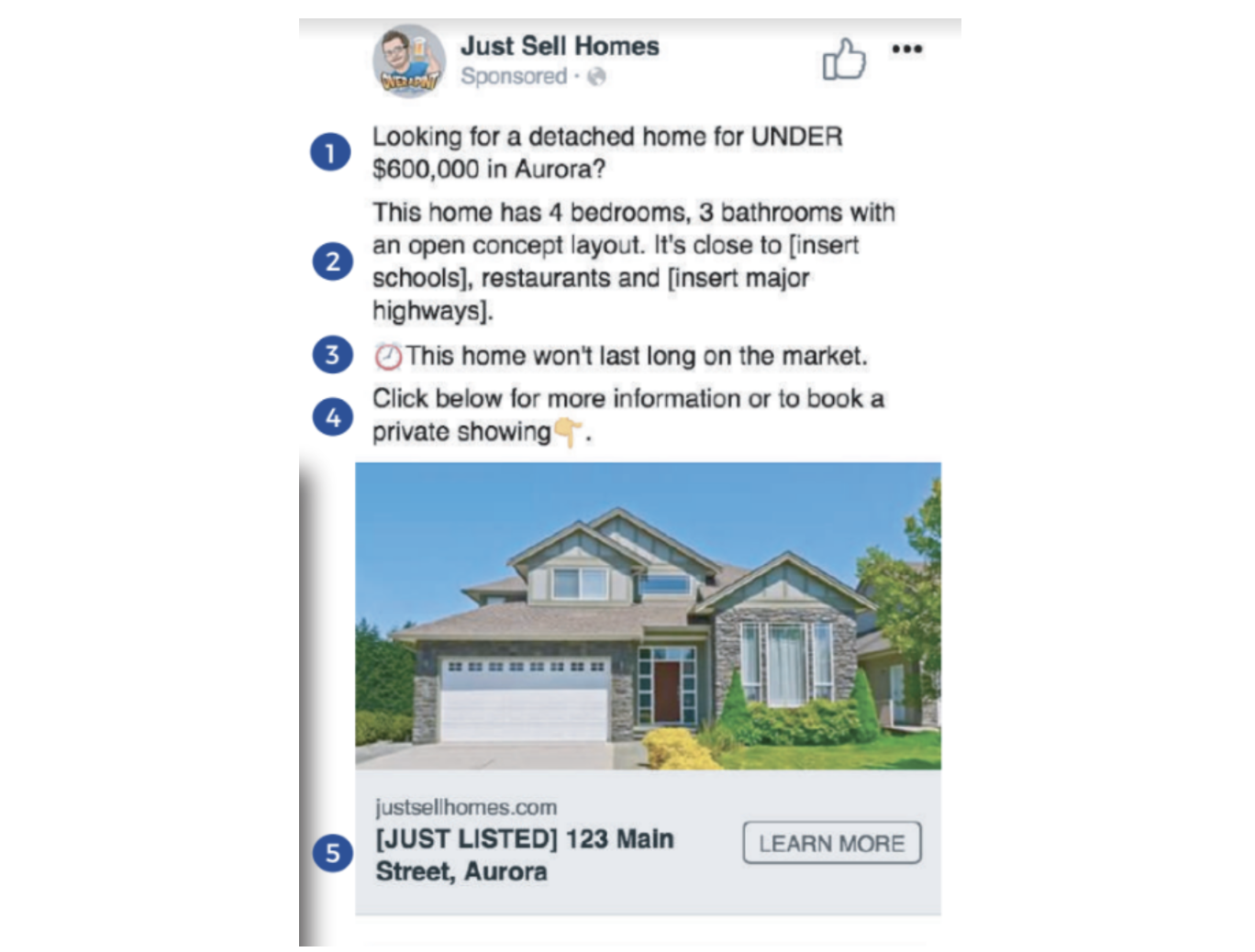
Let's break down what works by looking at each part of the ad.
Headline. The copy here is trying to reach a specific buyer: someone with a budget of $600,000 looking in Aurora. Your leads are targeted, so it's good to get to the point right away.
Body. Here, the ad highlights some of the key features that buyers are curious about: number of bedrooms, yard features, proximity to transportation, and so on.
Note of urgency. You want people to feel like they're missing out if they don't click.
Call to action. Tell people the next steps you want them to take. Be specific.
Details of property. Don't forget to give people the address and status of the property. Was it just listed? Is it pre-foreclosure? Has there been a price reduction?
Using an ad like this, Andrew has been been able to generate leads for an average of $1 to $5 per lead, which includes the prospect's full name, email, and phone number.
But Evan Roberts, a real estate agent with Dependable Homebuyers in Baltimore, emphasizes that it can be detrimental to stick to one style for too long:
You need to constantly be keeping your advertising fresh with new eye-catching images, unique calls to action, and enough variety to attract the largest audience possible.
One strategy Evan and his team have used is picking an unconventional color scheme in their ads: black and white. Because most posts on Facebook are filled with color, when someone scrolls past your black-and-white ad, it pops out and grabs their attention.

Similarly, John Huntinghouse cited extensive experimentation and testing as a key to running successful campaigns for his real estate clients:
Iterate your ad targeting every week. You should always have multiple ad sets (at least two, but we like to use five to 10), and have each ad set contain at least two ad creatives. This way, you can find the winners and put the bulk of your marketing dollars behind them.
You might even experiment with a single image versus a slideshow versus a video to see which grabs your leads' attention best. And remember: always use professional photos. It's surprising how many photos look like they were snapped from a cell phone—that's not going to stand out among a news feed full of selfies.
Tap into natural human curiosity
It's common knowledge that advertisers love to use human curiosity to their advantage. Give leads just enough information to get them interested—but without giving away the flashiest info—and they're more likely to click. This is certainly true for specific property listings. For example, you might say that the kitchen has a unique feature you won't find anywhere else, but don't tell them what that feature is until they click. (Pizza oven!)
But there are other ways to tap into people's curiosity. Misty Weaver covers a much smaller area than most, and she's generated a lot of interested leads in her local market through neighborhood reports.
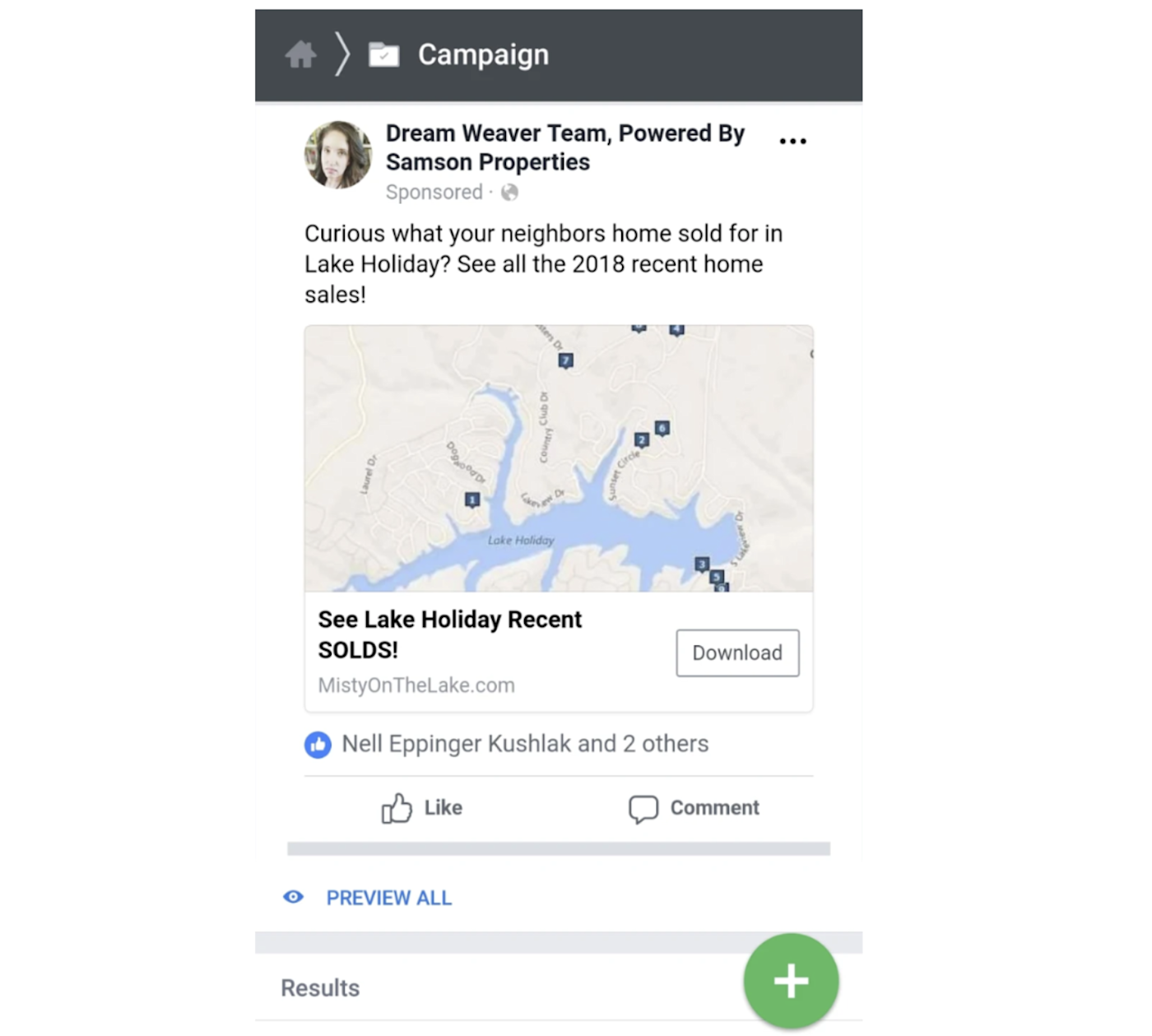
For sellers, I use a more targeted area, usually around a specific neighborhood with a map of the recent sales—and appeal to everyone's desire to know what their neighbors' homes sold for recently. A simple image and call to action to download the report, with a pin drop and mile or two radius, depending on the size of the community, has worked best.
These types of reports, especially when they're targeted—geographically or demographically in another way—grab people's attention. Other types of reports that can work are anything from relocation guides to foreclosure listings to lists of homes with very specific features.
Make the most of current events
Big news stories—local or otherwise—can help you generate eye-catching copy that hits the interest in your targeted areas.
Evan Roberts uses BuzzSumo to discover new trending topics and tie them into his Facebook lead ads' messaging through images and CTAs. A simple Google news alert can work well if you're trying to keep your eye on specific topics.
Here are a few examples of how you might use current events to your advantage with Facebook lead ads:
Does the home you're listing have an amazing finished basement? If it's football season, shout out the fact that it's the perfect place to host a party for the big game.
Maybe a famous celebrity just started a new clothing line. That's great fodder for featuring the huge walk-in closets that even an A-list star would love.
Keep an eye on awards for local attractions. If a nearby spot gets on a top 10 list, use the the view from the home's deck to highlight the proximity.
Automate Your Facebook Lead Ads
A key benefit of Facebook lead ads is the ability for agents to get leads in real time as they come in. Jeff Miller uses Zapier in his business to alert agents to new leads immediately:
We use Zapier to notify our real estate agents of a real estate lead as soon as it is collected on Facebook. Zapier allows us to add the lead to our CRM, send out a mass email, and create push notifications to our real estate agents' phones in real time. When time is of the essence, your follow up system can mean the difference between closing a lead or losing them to a competitor.
Here are the Zaps Jeff uses:
Send SMS messages for new leads from Facebook Lead Ads
And here are some other ways real estate agents can use Zaps to automate information from Facebook lead ads.
Create a leads database:
Add new Facebook Lead Ads leads to rows on Google Sheets
Create boxes on Streak for new Facebook Lead Ads leads
Subscribe new leads to email lists:
Subscribe new Facebook Lead Ad leads to a Mailchimp list
Add or update ActiveCampaign contacts with new Facebook Lead Ads leads
Add new Facebook Lead Ads leads to AWeber as subscribers
Send new leads a text message:
Send new Facebook Lead Ads leads a text message via ClickSend SMS
Don't see the workflow you're looking for? Browse more Facebook lead ads automations here, or create your own custom workflow.
Facebook lead ads can transform the way real estate agents do business. Targeting the most qualified leads, creating eye-catching ads with the right content, and setting up a system for quick alerts can revolutionize your lead generation and help you grow your business.
Related Reading:
Title photo remixed from an original by go digital via Flickr


